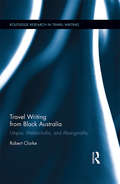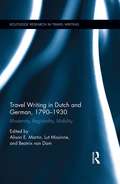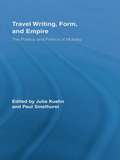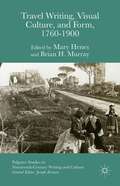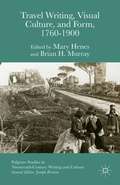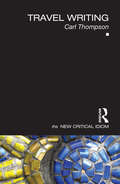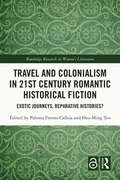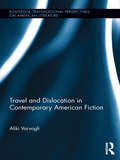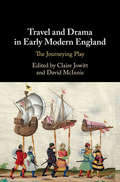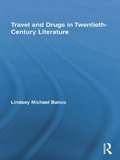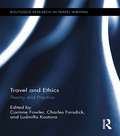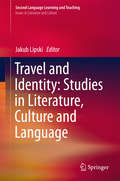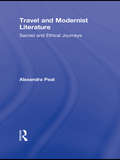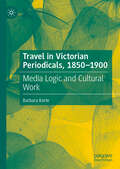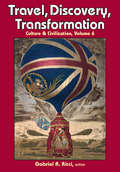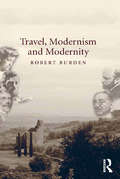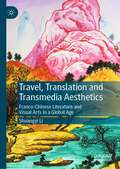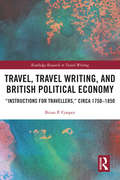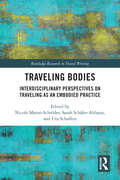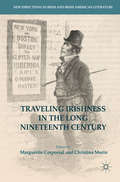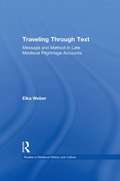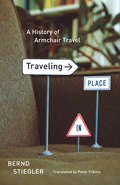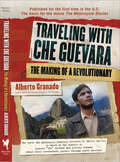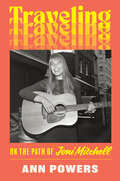- Table View
- List View
Travel Writing from Black Australia: Utopia, Melancholia, and Aboriginality (Routledge Research in Travel Writing)
by Robert ClarkeOver the past thirty years the Australian travel experience has been 'Aboriginalized'. Aboriginality has been appropriated to furnish the Australian nation with a unique and identifiable tourist brand. This is deeply ironic given the realities of life for many Aboriginal people in Australian society. On the one hand, Aboriginality in the form of artworks, literature, performances, landscapes, sport, and famous individuals is celebrated for the way it blends exoticism, mysticism, multiculturalism, nationalism, and reconciliation. On the other hand, in the media, cinema, and travel writing, Aboriginality in the form of the lived experiences of Aboriginal people has been exploited in the service of moral panic, patronized in the name of white benevolence, or simply ignored. For many travel writers, this irony - the clash between different regimes of valuing Aboriginality - is one of the great challenges to travelling in Australia. Travel Writing from Black Australia examines the ambivalence of contemporary travelers' engagements with Aboriginality. Concentrating on a period marked by the rise of discourses on Aboriginality championing indigenous empowerment, self-determination, and reconciliation, the author analyses how travel to Black Australia has become, for many travelers, a means of discovering 'new'--and potentially transformative--styles of interracial engagement.
Travel Writing in Dutch and German, 1790-1930: Modernity, Regionality, Mobility (Routledge Research in Travel Writing)
by Alison E. Martin Lut Missinne Beatrix Van DamThis volume focuses on how travel writing contributed to cultural and intellectual exchange in and between the Dutch- and German-speaking regions from the 1790s to the twentieth-century interwar period. Drawing on a hitherto largely overlooked body of travelers whose work ranges across what is now Germany and Austria, the Netherlands and Dutch-speaking Belgium, the Dutch East Indies and Suriname, the contributors highlight the interrelations between the regional and the global and the role alterity plays in both spheres. They therefore offer a transnational and transcultural perspective on the ways in which the foreign was mediated to audiences back home. By combining a narrative perspective on travel writing with a socio-historically contextualized approach, essays emphasize the importance of textuality in travel literature as well as the self-positioning of such accounts in their individual historical and political environments. The first sustained analysis to focus specifically on these neighboring cultural and linguistic areas, this collection demonstrates how topographies of knowledge were forged across these regions by an astonishingly diverse range of travelling individuals from professional scholars and writers to art dealers, soldiers, (female) explorers, and scientific collectors. The contributors address cultural, aesthetic, political, and gendered aspects of travel writing, drawing productively on other disciplines and areas of scholarly research that encompass German Studies, Low Countries Studies, comparative literature, aesthetics, the history of science, literary geography, and the history of publishing.
Travel Writing, Form, and Empire: The Poetics and Politics of Mobility (Routledge Research in Travel Writing)
by Julia Kuehn Paul SmethurstThis collection of essays is an important contribution to travel writing studies -- looking beyond the explicitly political questions of postcolonial and gender discourses, it considers the form, poetics, institutions and reception of travel writing in the history of empire and its aftermath. Starting from the premise that travel writing studies has received much of its impetus and theoretical input from the sometimes overgeneralized precepts of postcolonial studies and gender studies, this collection aims to explore more widely and more locally the expression of imperialist discourse in travel writing, and also to locate within contemporary travel writing attempts to evade or re-engage with the power politics of such discourse. There is a double focus then to explore further postcolonial theory in European travel writing (Anglophone, Francophone and Hispanic), and to trace the emergence of postcolonial forms of travel writing. The thread that draws the two halves of the collection together is an interest in form and relations between form and travel.
Travel Writing, Visual Culture and Form, 1760–1900 (Palgrave Studies in Nineteenth-Century Writing and Culture)
by Mary HenesThis collection reveals the variety of literary forms and visual media through which travel records were conveyed in the long nineteenth century, bringing together a group of leading researchers from a range of disciplines to explore the relationship between travel writing, visual representation and formal innovation.
Travel Writing, Visual Culture, and Form, 1760-1900 (Palgrave Studies in Nineteenth-Century Writing and Culture)
by Mary HenesThis collection reveals the variety of literary forms and visual media through which travel records were conveyed in the long nineteenth century, bringing together a group of leading researchers from a range of disciplines to explore the relationship between travel writing, visual representation and formal innovation.
Travel Writing: The New Critical Idiom (The New Critical Idiom)
by Carl ThompsonAn increasingly popular genre – addressing issues of empire, colonialism, post-colonialism, globalization, gender and politics – travel writing offers the reader a movement between the familiar and the unknown. In this volume, Carl Thompson: introduces the genre, outlining competing definitions and key debates provides a broad historical survey from the medieval period to the present day explores the autobiographical dimensions of the form looks at both men and women’s travel writing, surveying a range of canonical and more marginal works, drawn from both the colonial and postcolonial era utilises both British and American travelogues to consider the genre's role in shaping the history of both nations. Concise and practical, Travel Writing is the ideal introduction for those new to the subject, as well as a crucial overview of current debates in the field.
Travel and Colonialism in 21st Century Romantic Historical Fiction: Exotic Journeys, Reparative Histories? (Routledge Research in Women's Literature)
by Hsu-Ming Teo Paloma Fresno-CallejaRomantic fiction has often involved stories of travel. In narratives of the journey towards love, "romance" often involves encounters with "exotic" places and peoples. When history is invoked in such stories, the past itself is exoticised and treated as "other" to the present to serve the purposes of romanticisation: a narrative strategy by which all manner of things – settings, characters, costumes, customs, consumables – are made to perform a luxuriant otherness that amplifies the experience of love. This volume questions the reparative function of Anglophone romantic historical fiction to ask: can plots of travel and discourses of tourism empower women while narrating stories of healing for the wounds of the past? This is the first volume to consider how romanticised and exoticised women’s historical fiction not only serves the purposes of armchair travel but may also replicate colonial discourse, unintentionally positioning readers as neocolonial, neo-Orientalist cultural voyeurs as well as voyagers.
Travel and Dislocation in Contemporary American Fiction (Routledge Transnational Perspectives on American Literature)
by Aliki VarvogliThis book offers a critical study and analysis of American fiction at the beginning of the twenty-first century. It focuses on novels that ‘go outward’ literally and metaphorically, and it concentrates on narratives that take place mainly away from the US’s geographical borders. Varvogli draws on current theories of travel globalization and post-national studies, and proposes a dynamic model that will enable scholars to approach contemporary American fiction and assess recent changes and continuities. Concentrating on work by Philip Caputo, Dave Eggers, Norman Rush and Russell Banks, the book proposes that American literature’s engagement with Africa has shifted and needs to be approached using new methodologies. Novels by Amy Tan, Garrison Keillor, Jonathan Safran Foer and Dave Eggers are examined in the context of travel and globalization, and works by Chang-rae Lee, Ethan Canin, Dinaw Mengestu and Jhumpa Lahiri are used as examples of the changing face of the American immigrant novel, and the changing meaning of national belonging.
Travel and Drama in Early Modern England: The Journeying Play (Early Modern Literature in History)
by Claire Jowitt David McInnisThis agenda-setting volume on travel and drama in early modern England provides new insights into Renaissance stage practice, performance history, and theatre's transnational exchanges. It advances our understanding of theatre history, drama's generic conventions, and what constitutes plays about travel at a time when the professional theatre was rapidly developing and England was attempting to announce its presence within a global economy. Recent critical studies have shown that the reach of early modern travel was global in scope, and its cultural consequences more important than narratives that are dominated by the Atlantic world suggest. This collection of essays by world-leading scholars redefines the field by expanding the canon of recognized plays concerned with travel. Re-assessing the parameters of the genre, the chapters offer fresh perspectives on how these plays communicated with their audiences and readers.
Travel and Drugs in Twentieth-Century Literature (Routledge Studies in Twentieth-Century Literature #11)
by Lindsey Michael BancoThis book examines the connections between two disparate yet persistently bound thematics -- mobility and intoxication -- and explores their central yet frequently misunderstood role in constructing subjectivity following the 1960s. Emerging from profound mid-twentieth-century changes in how drugs and travel were imagined, the conceptual nexus discussed sheds new light on British and North American responses to sixties counterculture. With readings of Aldous Huxley, William Burroughs, Alex Garland, Hunter S. Thompson, and Robert Sedlack, Banco traces twin arguments, looking at the ways travel is imagined as a disciplinary force acting upon the creative, destabilizing powers of psychedelic intoxication; and exploring the ways drugs help construct travel spaces and practices as, at times, revolutionary, and at other times, neo-colonial. By following a sequence of shifting understandings of drug and travel orthodoxies, this book traverses fraught and irresistibly linked terrains from the late 1950s up to a period marked by international, postmodern tourism. As such, it helps illuminate a world where tourism is continually expanding yet constantly circumscribed, and where illegal drugs are both increasingly unregulated in the global economy and perceived more and more as crucial agents in the construction of human subjectivity.
Travel and Ethics: Theory and Practice (Routledge Research in Travel Writing)
by Charles Forsdick Corinne Fowler Ludmilla KostovaDespite the recent increase in scholarly activity regarding travel writing and the accompanying proliferation of publications relating to the form, its ethical dimensions have yet to be theorized with sufficient rigour. Drawing from the disciplines of anthropology, linguistics, literary studies and modern languages, the contributors in this volume apply themselves to a number of key theoretical questions pertaining to travel writing and ethics, ranging from travel-as-commoditization to encounters with minority languages under threat. Taken collectively, the essays assess key critical legacies from parallel disciplines to the debate so far, such as anthropological theory and postcolonial criticism. Also considered, and of equal significance, are the ethical implications of the form’s parallel genres of writing, such as ethnography and journalism. As some of the contributors argue, innovations in these genres have important implications for the act of theorizing travel writing itself and the mode and spirit in which it continues to be conducted. In the light of such innovations, how might ethical theory maintain its critical edge?
Travel and Identity: Studies in Literature, Culture and Language (Second Language Learning and Teaching)
by Jakub LipskiThis book presents a selection of research papers dealing with the notions of travel and identity in Anglophone literature and culture. Collectively, the chapters ponder such notions as self and other, race, centre and periphery, thus shedding new light on a number of issues that are highly relevant in the context of the ongoing migration crisis. The contributors employ a diverse range of theoretical standpoints – from close reading to deconstruction, from historically informed approaches to linguistic analysis – and thus offer a nuanced panorama of these issues, especially from the nineteenth century onwards.
Travel and Modernist Literature: Sacred and Ethical Journeys (Routledge Studies In Twentieth-century Literature Ser. #15)
by Alexandra PeatThrough close readings of works from Henry James to W. E. B. Du Bois, and from Virginia Woolf to Jean Rhys, this book discusses how fictional travelers negotiate and adapt various tropes of travel (such as quest, expatriation, displacement, and exile) as models for their own journeys. Specifically, Peat considers the ethical dimensions of modernist travel from two distinct vantages. The first focuses on the relationship between the secular and the sacred in modernist travel literature, arguing that the recurrent narrative of secular travel is haunted by a desire for spiritual transcendence. The second posits modernist travel fiction as a potentially positive example of transcultural relations, consciously arguing against the received notion that travel during an imperial era is always by nature itself imperialist. Throughout, particular attention is paid to the transnational nature of modernism and the various global flows traced by modernist literature.
Travel in Victorian Periodicals, 1850-1900: Media Logic and Cultural Work
by Barbara KorteThis is the first study to explore the connections between the development of travel and the rapid expansion of the periodicals market in the second half of the nineteenth century in Britain. By the 1860s, travel articles had become a staple of the periodicals market and reached readers who might never have travelled far themselves or bought a travel book. This monograph demonstrates that the representation of travel in Victorian periodicals came in forms and with cultural functions that differed from book publication, and that this media-specific representation helped to inscribe travel into the Victorian lifeworld. Based on a corpus of several general-interest periodicals targeted at different audiences, this book investigates how different readers - the family, women, young people and the working classes - engaged with travel. It argues that travel articles in periodicals performed significant cultural work because they accommodated readers to travel.
Travel, Discovery, Transformation (Culture And Civilization Ser.)
by Gabriel R. RicciThis latest volume in the Culture & Civilization series gathers interdisciplinary voices to present a collection of essays on travel and travel narratives. The essays span a range of topics from iconic ancient travel stories to modern tourism. They discuss travel in the ancient world, modern heroic travels, the literary culture of missionary travel, the intersection of fiction and travel narratives, modern literary traditions and visions of Greece, personal identity, and expatriation. Essays also address travel memoirs, the re-imagining of worlds through travel, transformed landscapes and animals in travel narratives, diplomacy, English women travel writers, and pilgrimage and health in the medieval world.The history of travel writing takes in multiple pursuits: exploration and conquest, religious pilgrimage and missionary work, educational tourism and diplomacy, scientific and personal discovery, and natural history and oral history. As a literary genre, it has enhanced a wide range of disciplines, including geography, ethnography, anthropology, and linguistics. Moreover, twenty-first-century interests in travel and travel writing have produced a global framework that promises to expand travel's theoretical reach into the depths of the Internet, thus challenging our conventional concept of what it means to travel.The fact that travel and travel writing have a prehistory that is embedded in foundational religious texts and ancient narratives of journey, like the Odyssey and the Epic of Gilgamesh, makes both travel and travel writing fundamental and essential expressions of humanity. Travel encourages writing, particularly as epistolary and poetic chronicling. This is clearly a history and tradition that began with human communication and which has kept pace with our collective development.
Travel, Modernism and Modernity
by Robert BurdenFocusing on the significance of travel in Joseph Conrad, E.M. Forster, D.H. Lawrence, Henry James, and Edith Wharton, Robert Burden shows how travel enabled a new consciousness of mobility and borders during the modernist period. For these authors, Burden suggests, travel becomes a narrative paradigm and dominant trope by which they explore questions of identity and otherness related to deep-seated concerns with the crisis of national cultural identity. He pays particular attention to the important distinction between travel and tourism, at the same time that he attends to the slippage between seeing and sightseeing, between the local character and the stereotype, between art and kitsch, and between older and newer ways of storytelling in the representational crisis of modernism. Burden argues that the greater awareness of cultural difference that characterizes both the travel writing and fiction of these expatriate writers became a defining feature of literary modernism, resulting in a consciousness of cultural difference that challenged the ethnographic project of empire.
Travel, Translation and Transmedia Aesthetics: Franco-Chinese Literature and Visual Arts in a Global Age
by Shuangyi LiThis book examines the works of four contemporary first-generation Chinese migrant writer-artists in France: François CHENG, GAO Xingjian, DAI Sijie, and SHAN Sa. They were all born in China, moved to France in their adulthood to pursue their literary and artistic ambitions, and have enjoyed the highest French and Western institutional recognitions, from the Grand Prix de la Francophonie to the Nobel Prize in Literature. They have established themselves not only as writers, but also as translators, calligraphers, painters, playwrights, and filmmakers mainly in their host country. French has become their dominant—but not only—language of literary creation (except for Gao); yet, linguistic idioms, poetic imagery, and classical thought from Chinese cultural heritage permeate their French texts and visual artworks, reflecting a strong translingual and transmedial sensibility. The book provides not only distinctive literary and artistic examples beyond existing studies of intercultural encounter, French postcolonial, and Chinese diasporic enquiries; more importantly, it formulates a theoretical model that captures the creative dynamics between the French/francophone and Chinese/sinophone spaces of articulation, thereby contributing to contemporary debates about literary and artistic production, interpretation, and circulation in the global development of comparative/world literature, as well as intermediality studies.
Travel, Travel Writing, and British Political Economy: “Instructions for Travellers,” circa 1750–1850 (Routledge Research in Travel Writing)
by Brian P. CooperThe book draws on the history of economics, literary theory, and the history of science to explore how European travelers like Alexander von Humboldt and their readers, circa 1750–1850, adapted the work of British political economists, such as Adam Smith, to help organize their observations, and, in turn, how political economists used travelers’ observations in their own analyses. Cooper examines journals, letters, books, art, and critical reviews to cast in sharp relief questions raised about political economy by contemporaries over the status of facts and evidence, whether its principles admitted of universal application, and the determination of wealth, value, and happiness in different societies. Travelers citing T.R. Malthus’s population principle blurred the gendered boundaries between domestic economy and British political economy, as embodied in the idealized subjects: domestic woman and economic man. The book opens new realms in the histories of science in its analyses of debates about gender in social scientific observation: Maria Edgeworth, Maria Graham, and Harriet Martineau both observe a role associated with women and methodically interpret what they observe, an act reserved, in theory, by men.
Traveling Bodies: Interdisciplinary Perspectives on Traveling as an Embodied Practice (Routledge Research in Travel Writing)
by Nicole Maruo-Schröder, Sarah Schäfer-Althaus, and Uta SchaffersTraveling Bodies: Interdisciplinary Perspectives on Traveling as an Embodied Practice explores the central role the body has in and for traveling and thus complements and expands upon existing research in travel studies with new perspectives on and insights in the entanglement of bodies and traveling. The case studies assembled in this volume discuss a variety of traveling practices, experiences, and media with chapters featuring Asian, American, and European historical and contemporary perspectives. Truly interdisciplinary in its approach, the volume identifies and examines diverse literary, historical and cultural texts, contexts, and modes in which traveling and the body intersect, including ‘classic’ travelogues, (new) media (e.g., film, digital travel apps), surf culture, and travel-inspired tattoos. The contributions offer various avenues for further research, not only for scholars working with body theory and travel (writing), but also for anyone interested in the intersections of literature, culture, media, and embodied practices of traveling.
Traveling Irishness in the Long Nineteenth Century
by Christina Morin Marguérite CorporaalExploring the effects of travelling, migration, and other forms of cultural contact, particularly within Europe, this edited collection explores the act of traveling and the representation of traveling by Irish men and women from diverse walks of life in the period between Grattan's Parliament (1782) and World War I (1914). This was a period marked by an increasing physical and cultural mobility of Irish throughout Britain, Continental Europe, the Americas, and the Pacific. Travel was undertaken for a variety of reasons: during the Romantic period, the 'Grand Tour' and what is now sometimes referred to as medical tourism brought Irish artists and intellectuals to Europe, where cultural exchanges with other writers, artists, and thinkers inspired them to introduce novel ideas and cultural forms to their Irish audiences. Showing this impact of the nineteenth-century Irish across national borders and their engagement with global cultural and linguistic traditions, the volume will provide novel insights into the transcultural spheres of the arts, literature, politics, and translation in which they were active.
Traveling Through Text: Message and Method in Late Medieval Pilgrimage Accounts (Studies in Medieval History and Culture)
by Elka WeberTraveling through Text compares religious ravel writing by Muslims, Christians and Jews in later Middle Ages. This comparative approach allows us to see that writers in all three religious communities used travel writing in the same way, to shape the perceptions of their readers by asserting the author's authority. The central paradox of religious travel writing is that the travel writer reads about a place, usually in a sacred text, decide to supplement the reading with the empirical experience of visiting and describing the place, and the creates his own descriptive text. But in writing this new book, and in letting his readers know his authorial authority, the travel writer himself is daring the reader to challenge the new text. Is a book ever enough? For societies that value their sacred texts, this question is a challenge. But it is a challenge posed by writers who live firmly in the religious tradition.
Traveling in Place: A History of Armchair Travel
by Bernd Stiegler translated by Peter FilkinsArmchair travel may seem like an oxymoron. Doesn't travel require us to leave the house? And yet, anyone who has lost herself for hours in the descriptive pages of a novel or the absorbing images of a film knows the very real feeling of having explored and experienced a different place or time without ever leaving her seat. No passport, no currency, no security screening required--the luxury of armchair travel is accessible to us all. In Traveling in Place, Bernd Stiegler celebrates this convenient, magical means of transport in all its many forms. Organized into twenty-one "legs"--or short chapters--Traveling in Place begins with a consideration of Xavier de Maistre's 1794 Voyage autour de ma chambre, an account of the forty-two-day "journey around his room" Maistre undertook as a way to entertain himself while under house arrest. Stiegler is fascinated by the notion of exploring the familiar as though it were completely new and strange. He engages writers as diverse as Roussel, Beckett, Perec, Robbe-Grillet, Cortázar, Kierkegaard, and Borges, all of whom show how the everyday can be brilliantly transformed. Like the best guidebooks, Traveling in Place is more interested in the idea of travel as a state of mind than as a physical activity, and Stiegler reflects on the different ways that traveling at home have manifested themselves in the modern era, from literature and film to the virtual possibilities of the Internet, blogs, and contemporary art. Reminiscent of the pictorial meditations of Sebald, but possessed of the intellectual playfulness of Calvino, Traveling in Place offers an entertaining and creative Baedeker to journeying at home.
Traveling in Place: A History of Armchair Travel
by Bernd StieglerArmchair travel may seem like an oxymoron. Doesn’t travel require us to leave the house? And yet, anyone who has lost herself for hours in the descriptive pages of a novel or the absorbing images of a film knows the very real feeling of having explored and experienced a different place or time without ever leaving her seat. No passport, no currency, no security screening required—the luxury of armchair travel is accessible to us all. In Traveling in Place, Bernd Stiegler celebrates this convenient, magical means of transport in all its many forms. Organized into twenty-one “legs”—or short chapters—Traveling in Place begins with a consideration of Xavier de Maistre’s 1794 Voyage autour de ma chambre, an account of the forty-two-day “journey around his room” Maistre undertook as a way to entertain himself while under house arrest. Stiegler is fascinated by the notion of exploring the familiar as though it were completely new and strange. He engages writers as diverse as Roussel, Beckett, Perec, Robbe-Grillet, Cortázar, Kierkegaard, and Borges, all of whom show how the everyday can be brilliantly transformed. Like the best guidebooks, Traveling in Place is more interested in the idea of travel as a state of mind than as a physical activity, and Stiegler reflects on the different ways that traveling at home have manifested themselves in the modern era, from literature and film to the virtual possibilities of the Internet, blogs, and contemporary art. Reminiscent of the pictorial meditations of Sebald, but possessed of the intellectual playfulness of Calvino, Traveling in Place offers an entertaining and creative Baedeker to journeying at home.
Traveling with Che Guevara: The Making of a Revolutionary (Shooting Script Ser.)
by Alberto GranadoPublished for the first time in the U.S.—one of the two diaries on which the movie The Motorcycle Diaries is based—the moving and at times hilarious account of Che Guevara and Alberto Granado's eight-month tour of South America in 1952.In 1952 Alberto Granado, a young doctor, and his friend Ernesto Guevara, a 23-year-old medical student from a distinguished Buenos Aires family, decided to explore their continent. They set off from Cordoba in Argentina on a Norton 500cc motorbike and traveled through Chile, Peru, Colombia, and Venezuela. The duo's adventures vary from the suspenseful (stowing away on a cargo ship, exploring Incan ruins) to the comedic (falling in love, drinking, fighting...) to the serious (volunteering as firemen and at a leper colony). They worked as day laborers along the way—as soccer coaches, medical assistants, and furniture movers. The poverty and exploitation of the native population started the process that was to turn Ernesto—the debonair, fun-loving student—into Che, the revolutionary who had a profound impact on the history of several nations.Originally published in Spanish in Cuba in 1978, the first English translation was published by Random House UK in 2003. The movie, based on Granado's and Che's diaries, directed by Walter Salles (Central Station, Behind the Sun), was produced by Robert Redford and others. Shown at the Sundance Film Festival, it generated great reviews and a frenzied auction for distribution rights, which was won by Focus Features. Granado, now 82, was a consultant to Salles during the production. 10 b/w photos.
Traveling: On the Path of Joni Mitchell
by Ann Powers*An Observer Best New Biographies of 2024*Celebrated NPR music critic Ann Powers explores the life and career of Joni Mitchell in a lyrical style as fascinating and ethereal as the songs of the artist herself..“What you are about to read is not a standard account of the life and work of Joni Mitchell. Instead, it’s a tale of long journeying through a life that changed popular music: of a homesick wanderer forging ahead on routes of her own invention, and of me on her trail, heading toward the ringing of her voice.”—From the introductionFor decades, Joni Mitchell’s life and music have enraptured listeners. One of the most celebrated artists of her generation, Mitchell has inspired countless musicians—from peers like James Taylor, to inheritors like Prince and Brandi Carlile—and authors, who have dissected her music and her life in their writing. At the same time, Mitchell has always been a force beckoning us still closer, as—with the other arm—she pushes us away. Given this, music critic Ann Powers wondered if there was another way to draw insights from the life of this singular musician who never stops moving, never stops experimenting.In Traveling, Powers seeks to understand Mitchell through her myriad journeys. Through extensive interviews with Mitchell's peers and deep archival research, she takes readers to rural Canada, mapping the singer’s childhood battle with polio. She charts the course of Mitchell’s musical evolution, ranging from early folk to jazz fusion to experimentation with pop synthetics. She follows the winding road of Mitchell’s collaborations with other greats, and the loves that emerged along the way, all the way through to the remarkable return of Mitchell to music-making after the 2015 aneurysm that nearly took her life.Along this journey, Powers’ wide-ranging musings on the artist’s life and career reconsider the biographer’s role and the way it twines against the reality of a fan. In doing so, Traveling illustrates the shifting nature of biography, and the ultimate contradiction of celebrity: that an icon cannot truly, completely be known to a fan.Kaleidoscopic in scope, and intimate in its detail, Traveling is a fresh and fascinating addition to the Joni Mitchell canon, written by a biographer in full command of her gifts who asks as much of herself as of her subject.
